It’s 11:30am on a Tuesday in Longford District Court. The day’s proceedings have moved to the ‘charge sheet’ cases. It’s case four on a list that has 67 matters scheduled for hearing.
The District Court list is divided into sections; the charge sheet and the summons. The charge sheets are documents prepared by An Garda Síochána containing details of the offence defendants are charged with.
There’s a pause in proceedings. The defendant, who was told to be in court for 10:30am, hasn’t shown up.
It’s a minor public order matter. The defendant, a man in his early 20s, was socialising, got drunk, fell asleep on a public walkway and became abusive when woken by Gardaí.
The charges of public intoxication and being abusive to the officers were first presented to court two months earlier.
At that stage the defendant’s legal representative told the judge his client was pleading guilty. The solicitor asked the judge to consider a charity donation, rather than a conviction. Although a minor matter, a criminal conviction can have implications.
Observing the defendant had no previous conviction the presiding judge said if he pays €250 to a local charity the young man can avoid a conviction. If he fails to make the charity donation he will be fined €250 and have four months to pay that fine, with a two month prison sentence in lieu of payment. She then adjourned the case.
Eight weeks later the defendant is a no show for court. The solicitor has sent letters, emails, texts and has tried to phone the client, but he has not replied. They ask if the judge would consider giving the defendant a little time, putting it in the ‘second calling’ list.
The judge’s acquiesce to the request is temporary. When the list moves into the afternoon and the defendant fails to attend the judge imposes the default; the €250 fine.
The fine will probably go unpaid. A bench warrant will be issued, the defendant will be arrested, if he still won’t pay then the prison part of the sentence is activated.
The young man will be driven by Gardaí to Castlerea Prison in Roscommon. The Governor of the prison, who is endeavouring to cope with capacity issues, will note that the convicted man has been handed down a two month custodial sentence for falling asleep when drunk.
The defendant will sign a document to say he has been admitted to prison, he will be handed bus fare and will head back from whence he came.
It’s a flaw in the system. It undermines the notion of justice, because it re-enforces complacency.
It’s not that there is a lack of will to change things, but it’s a question of resources. For a system that must process organised criminals, intervene in the legal process of family disintegration and preside over commercial and civil disputes the maximising of resources is a significant challenge.
In Budget 2024, €185 million was allocated to the Courts Services, this includes capital funding of €67 million.
In contrast Ireland’s 2024 National Service Plan (NSP) for the HSE has an allocated budget of €23.5 billion.
It’s not a fair comparison. More people interact with health services than with the justice system. Health is a very costly business.
That said, justice is integral to social stability. The minor flaw at the lowest level of the Irish court system is a fissure that runs through global justice.
Courts are about making the members of our society feel safe. They are the instrument of justice, ensuring that everyone is treated in an equitable and fair manner.
We laud our institutes of justice. At home it’s the Four Court, in Europe it’s the European court of Justice in Strasbourg, while The Hague in the Netherlands is home to the International Court of Justice (ICJ), (the principal judicial organ of the United Nations), the International Criminal Court (ICC) and Permanent Court of Arbitration (PCA)
That three of the world’s palaces of justice are in Den Haag is no surprise, given its moniker of The International City of Peace and Justice.
Last week marked the 125th anniversary of the Hague Peace Convention, a pivotal moment in the global administration of justice.
In 1899 Queen Wilhemina of the Netherlands and Russia’s Tsar Nicholas II hosted world leaders in the Dutch city as a global realisation formed that humanitarian efforts needed a wider reach.
During that Peace Convention, the Permanent Court of Arbitration (PCA) was established. The court sits in the Peace Palace, a symbol of global cooperation and the desire to fulfil humanitarian ideals.
Philanthropist Andrew Carnegie contributed $1.5 million towards its construction. It represents the aspirations of an intentional community. Nations across the world gifted constructions materials and artworks to create a transnational home for justice.
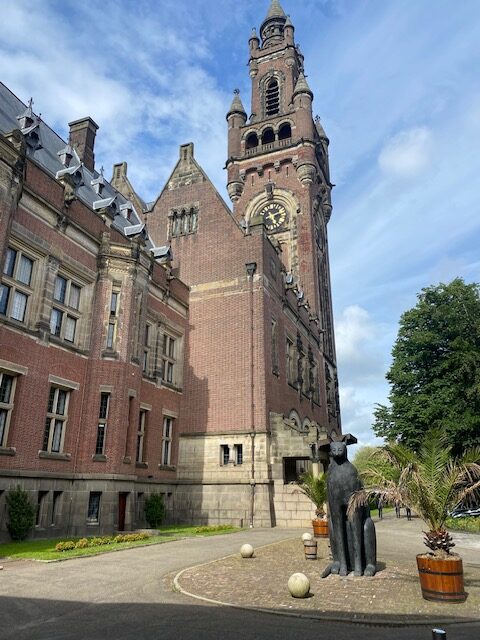
The Peace Palace
Built in 1913 the Peace Palace houses the PCA and the United Nations International Court of Justice (ICJ). Both institutions work towards the same goal: the peaceful settlement of disputes through arbitration, mediation, or adjudication.
The ICJ’s primary function is to pass judgment upon disputes between sovereign states.
It’s presided over by 15 sitting judges, each serving a renewable nine year term. Every three years one third of the judges are appointed by the UN General Assembly and the Security Council following simultaneous elections.
In May 1947 the United Kingdom submitted the first suit to the court when they filed a case against Albania about incidents in the Corfu Channel. In the intervening 77 years around 200 cases have been brought before the Court by countries all over the world.
The ICJ’s role in contentious cases is to deliver binding decisions. The enforcement mechanism itself is ‘State-led’ and results in the States in question taking steps to implement the Court’s judgments.
Although recognised as a focal point for international justice for more than 75 years, such an enforcement mechanism is not a foolproof method of administering justice.
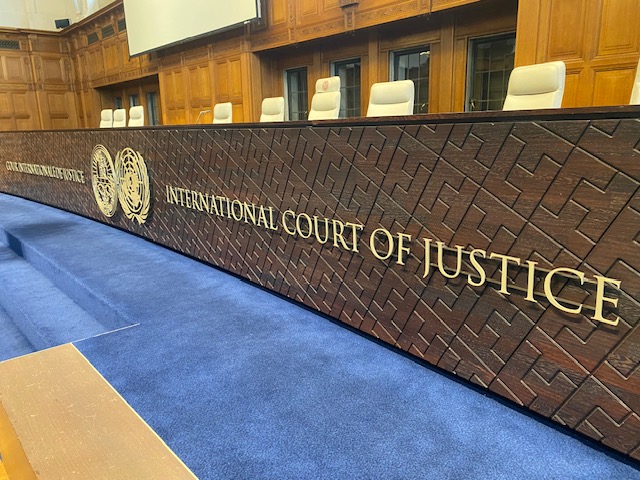
In January of this year South Africa made an application accusing Israel of committing genocide in the Gaza Strip. The ICJ found that “at least some of the rights claimed by South Africa and for which it is seeking protection are plausible”.
In the months since those ICJ’s finding the humanitarian crisis in the region continues. This had led to suggestions the ICJ lacked real power.
Permanent Court of Arbitration cases span a range of legal issues involving territorial and maritime boundaries, sovereignty, human rights, international investment, and international and regional trade.
The PCA heard a 2005 dispute between the Russian Federation and three of the major international shareholders of the Yukos Oil Company remains the largest investment arbitration in history.
The shareholders alleged Russian government interference in the running of Yukos resulted in the company going bankrupt and eliminating the value of their shares.
The PCA Arbitral Tribunals found unanimously that Russia had breached the internationally-recognised Energy Charter Treaty and awarded damages of more than $50 billion to the three shareholders.
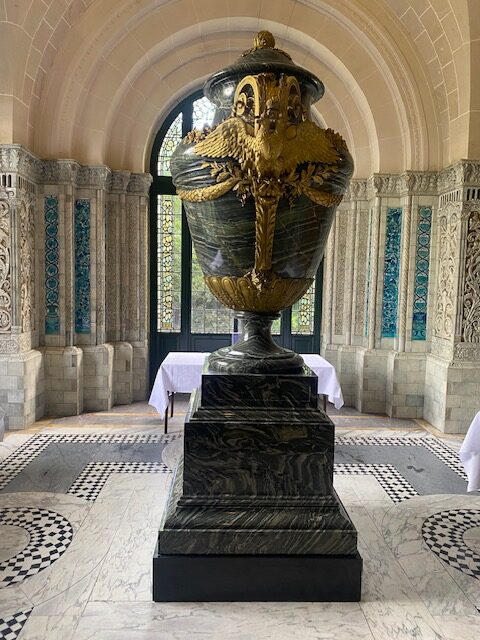
The 3 tonne green jasper vase, donated by Tsar Nicolas II of Russia in 1912, rests on a cornerstone of the Peace Palace
Despite the findings the case has not been wound up, the Russian Federation continues to shunt it back onto the legal roundabout.
Less than six kilometres across town in Oude Waalsdorperweg is the International Criminal Court.
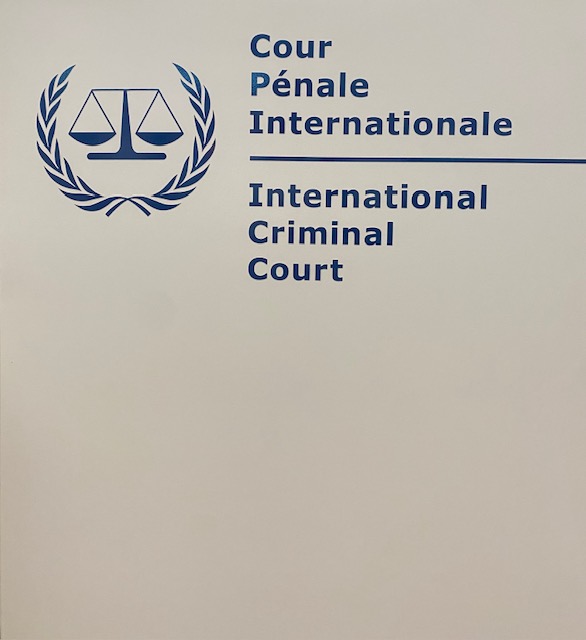
International Criminal Court cases range from destruction of historical monuments to genocide
The ICC is a criminal court where individuals can be tried for international crimes. These involve war crimes, crimes against humanity, genocide and the crime of aggression.
Established in 2002 following a a treaty called the Rome Statute, the ICC is a vital innovation in international law and human rights.
There are 124 states party to the Rome Statute. In the last 22 years 31 cases have come before the Court, with some cases having more than one suspect.
ICC judges have issued 46 arrest warrants, 21 people have been detained in the ICC detention centre, 17 people remain at large. Charges have been dropped against seven people due to their deaths.
In the lifespan of the court the judges have issued 10 convictions and 4 acquittals.
For a global institute those numbers seem quite low, but the nature of the prosecutions is what makes them significant. The prosecutions only commence when there is no prospect of justice in the state the offence happened.
On top of this is the same issue that beleaguers the lower tier of the Irish court system: resources. The 2024 budget for the ICC was €187,084,300; that’s just €2m shy of the budget for Irish courts.
There are other problems. Some governments have refused to recognise the court’s assertion of jurisdiction, with other civil groups also accusing the court of bias, Eurocentrism and racism.
It’s not an unreasonable assertion. African nations make up 10 of the nations listed in the summary of investigations and prosecutions by the International Criminal Court. Of the seven others only two are European: Georgia and Ukraine.
To focus on the cracks, rather that the structure itself is to undermine global justice. Turning aspiration into rock solid justice was never going to be a simple process.
Prosecutors accept that the pace of completing a case is slow, but highlight the fact that victims often experience an improvement in circumstances while ICC investigations are taking place.
It’s a global version of the social stability provided by prosecuting public order matters in the lowest tier of courts. The ICC investigations spark a realisation that there are implications to actions.
The aspirations of the ICC, much like the construction of the Peace Palace, is to be a project to benefit humanity. Carnegie’s description of the Peace Palace as “the most holy building in the world, because it has the holiest end in view” is a pre-echo of what the ICC should be.
Globally the PCA, ICJ and the ICC may be accused of overlooking the performance aspect of law. The administration of justice has to have a theatrical facet, an adherence to the maxim “justice must be seen to be done”.
All legal systems have flaws. Engaging with them can feel like being stuck in a print by Maurits Cornelis Escher; climb a stairs, turn a corner, climb a stairs, turn a corner, and repeat.
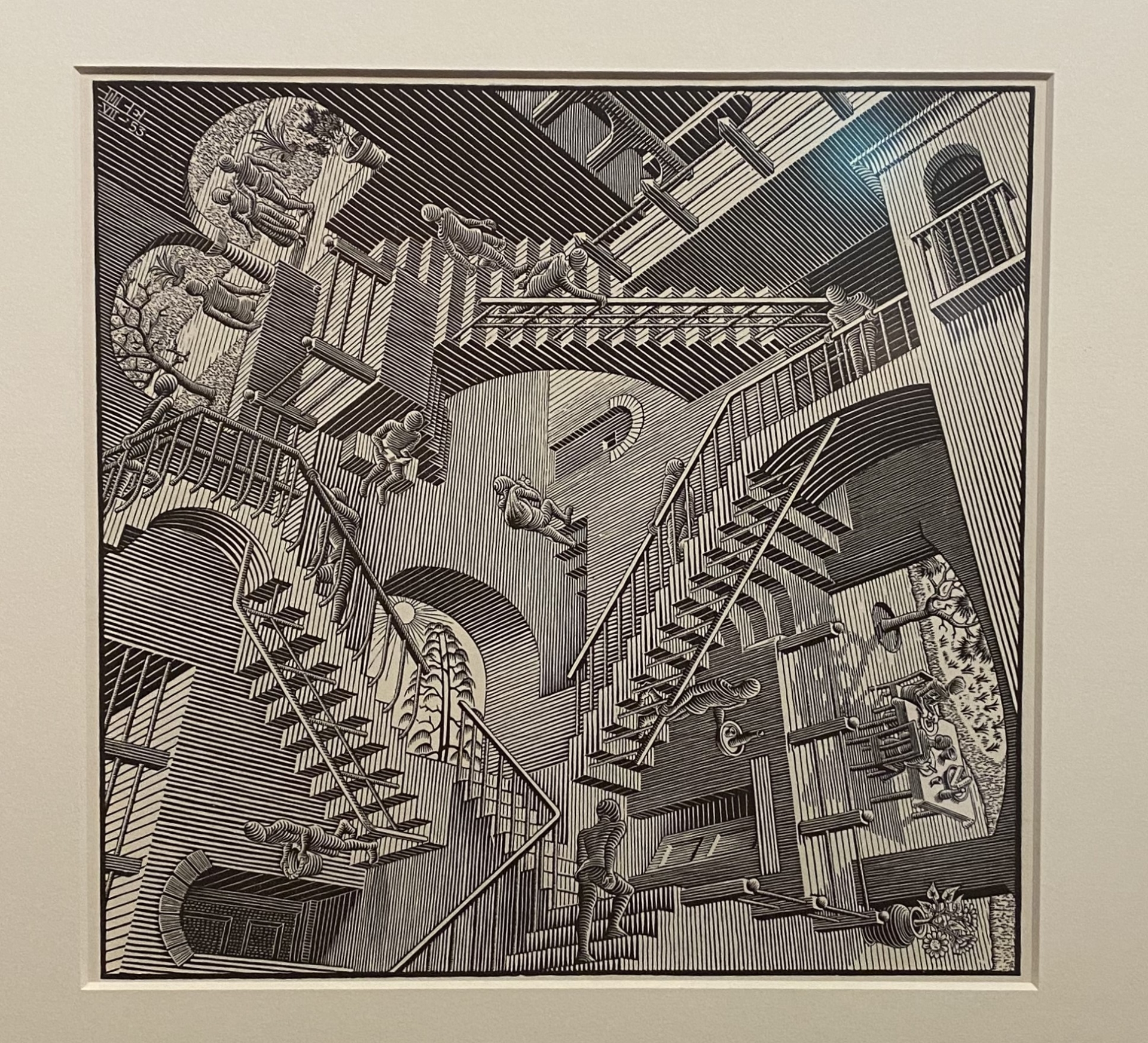
Relativity (1953) by M.C. Escher on display at Escher in the Palace in The Hague
To survive prolonged exposure to any legal system requires a sense of optimism. Optimism needs to be fed. The launch in The Hague last week of plans for an International Anti-Corruption Court provides such nourishment.
The Anti-Corruption Court’s aim is to hold kleptocrats and co-conspirators accountable when national governments are unable, or unwilling, to do so.
Maja Groff, Senior Treaty Advisor for Integrity Initiatives International Europe, says it’s the citizens of the world that will make the ambition a reality: “Civil societies were very important to the establishment of the Peace Conferences in the late 1800s, they remain important for the IACC project.”
To achieve such a noble end will require a global cooperation reminiscent of that which created the Peace Palace. In 1909 Japan decided to assign the imperial firm of Kawashima Jimbei in Kyoto to manufacture the finest wall tapestries with a theme of flowers and birds for the new Peace Palace.

A detail from the gobelins by Kawashima Jimbei at the Japanese room in the Peace Palace
These wall tapestries, or gobelins, are woven in the tradition of the ‘Tsuzure Nishiki‘ technique. For three years thousands of people worked day and night to produce this magnificent work of art.
This collective endeavour calls to mind The Hague’s Humanity Hub, a new ecosystem of international collaboration.
Over one billion people rely on nonprofits and volunteers, who operate in conflict zones and disaster responses. These NGOs provide essential services such as access to clean water, humanitarian aid, support for refugees, healthcare, human rights advocacy, combating gender-based violence, addressing climate change, and achieving sustainable development goals.
The work of the NGOs in the Humanity Hub are as much a part of global justice as the ICJ or the ICC. Among them is International Alert, a global peacebuilding charity established in 1986. It aims to promote dialogue, training, research, policy analysis, advocacy, and outreach activities.
They collaborate with Irish Aid on humanitarian projects across the globe: “Because of the political situations in many European countries there are funding cuts to peace building and humanitarian works and at the same time we see an increase in need,” an International Alert worker says of the challenges faced by NGOs.
As with all strata of the systems of justice across the world the issue of resources is a recurring theme.
In an area where they face many of the worst aspects of human behaviour the aid worker gives a lesson all humanity needs to observe: “I have to be optimistic, otherwise I wouldn’t do my job. What keeps me going is that I know I am not going to create world peace, but I can help create a small peace.
“By working with the community in The Inner Niger Delta on how to better manage water resources and bringing communities together, communities who would not otherwise be talking or even resorting to violence, we achieve small peace.”
Thanks to The Hague & Partners for providing access to PCA, ICJ, ICC and Humanity Hub.
This post was originally published on this site be sure to check out more of their content.








